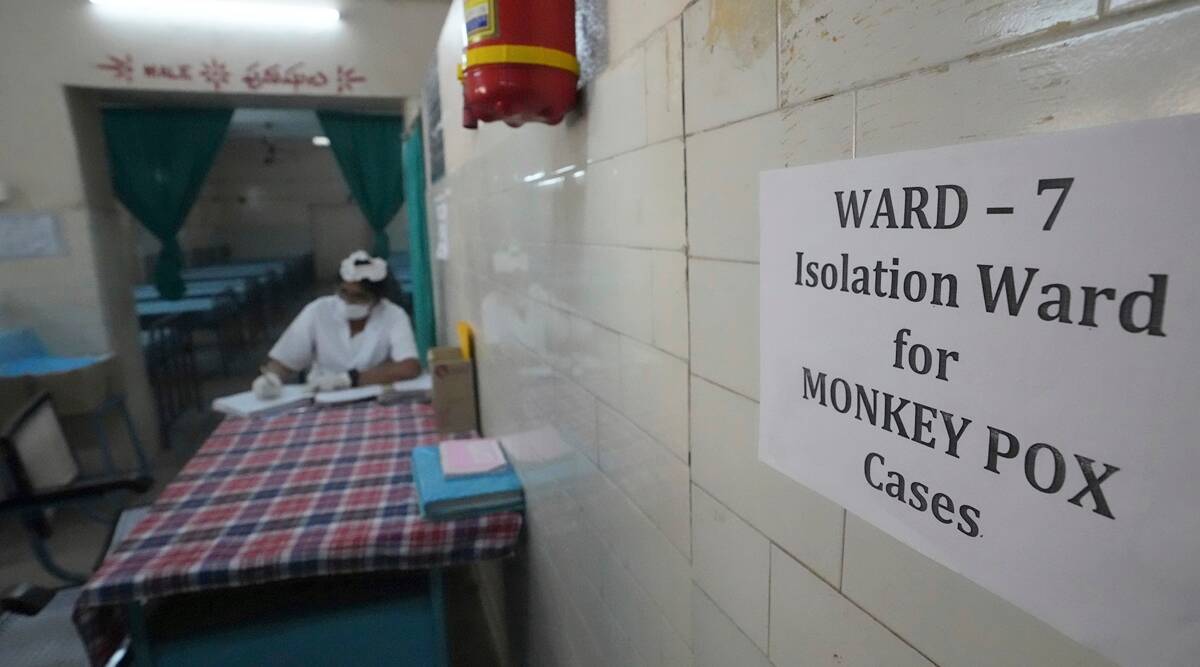 The WHO has declared monkeypox as a “public health emergency of international concern”, a description that it uses for only two other diseases, Covid-19 and polio. (File photo, representational)
The WHO has declared monkeypox as a “public health emergency of international concern”, a description that it uses for only two other diseases, Covid-19 and polio. (File photo, representational)The fourth case of monkeypox in the country has been confirmed in Delhi — importantly, in an individual who has no history of international travel. The three earlier cases, all in Kerala, had been detected in individuals who had arrived from the UAE.
The Delhi case, a 34-year-old man from West Delhi’s Paschim Vihar, was admitted to Lok Nayak hospital two days ago, with rashes and a fever that had lasted two weeks. “We suspected that he had monkeypox and admitted him to our isolation ward. He has now tested positive for the infection. He is being given symptomatic treatment,” a hospital official said.
The patient had travelled to Himachal Pradesh before falling sick. District surveillance teams are looking into whether he might have contracted the infection in Himachal, or from a friend he was in contact with.
The friend too has reported a history of fever. It is yet to be determined whether the friend had travelled overseas.
The surveillance teams have so far identified 13 contacts of the case, most of them family members and the doctor who had initially treated the patient. The contacts have been asked to remain in quarantine at home.
The first case of Monkeypox was detected in Delhi. The patient is stable and recovering.
There’s no need to panic. The situation is under control.
We have made a separate isolation ward at LNJP. Our best team is on the case to prevent the spread and protect Delhiites.
— Arvind Kejriwal (@ArvindKejriwal) July 24, 2022
“Further public health interventions like identification of the source of infection, enhanced contact tracing, testing sensitisation of private practitioners, etc. are being carried out. A high-level review of the situation has been planned by DGHS (Directorate General of Health Services),” the Union Health Ministry said in a statement.
The World Health Organisation (WHO) on Saturday declared monkeypox as a “public health emergency of international concern”, a description that it uses for only two other diseases, Covid-19 and polio.
“We have an outbreak that has spread around the world rapidly through new modes of transmission, about which we understand too little, and which meets the criteria (for the designation),” WHO director general Dr Tedros Adhanom Ghebreyesus said.
No longer imported
The Delhi case suggests the first instance of local human-to-human transmission of the disease in India. The three previous cases were detected in three different districts of Kerala — Kollam, Kannur, and Mallapuram — in persons with history of travel to the UAE. None of their contacts tested positive for the virus.
More than 16,000 cases of monkeypox infection have been reported from 75 countries around the world. Globally, the bulk of the infections outside Africa have been detected in men who have sex with men (MSM).
India’s first monkeypox case was reported on July 14, in a 35-year-old person who had returned to Kerala from the UAE. On July 18, Kerala confirmed its second case, in a 31-year-old male who had arrived in Kannur from Dubai on July 13, and on Friday, the third case was confirmed — in a 35-year-old patient who had come to Malappuram from the UAE on July 6.
A multi-disciplinary team from the Centre was sent to Kerala to coordinate public health measures after the first case was detected.
Monkeypox is a viral infection that is mainly transmitted from animals to humans. The first human case was reported in 1970 in the Democratic Republic of the Congo, and the disease subsequently became endemic to several West and Central African countries.
Human-to-human transmission has been previously limited, as the smallpox vaccine used for the eradication of the disease in the 1970s also protected against monkeypox. Among humans, monkeypox spreads through close contact with someone who has a monkeypox rash, but scientists are now looking at sexual transmission of the disease.
The most common symptoms of monkeypox include fever, headaches, muscle aches, back pain, low energy, and swollen lymph nodes, along with pox rashes that last for two to three weeks. It is a self-limiting disease, but can lead to death especially in children and those with weak immune systems. Complications of the infection include pneumonia, secondary skin infections, confusion, and eye problems.
Subscriber Only Stories
(With ENS Shimla)
- The Indian Express website has been rated GREEN for its credibility and trustworthiness by Newsguard, a global service that rates news sources for their journalistic standards.

